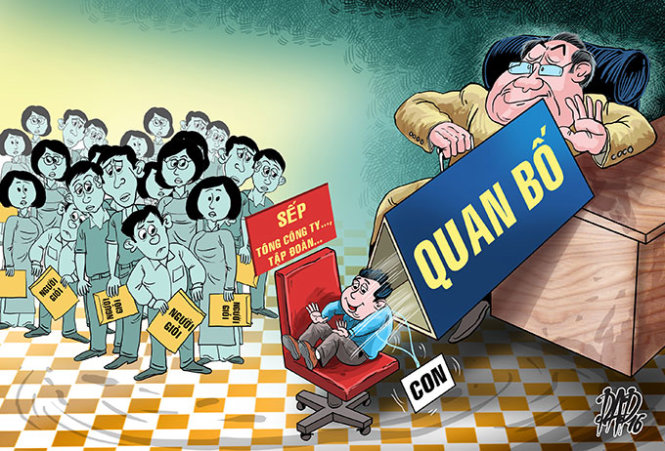Editor’s note: Dr. Terry F. Buss, a fellow at the National Academy of Public Administration, discusses some possible solutions to end nepotism, favoritism and cronyism Vietnam could learn from the U.S. and other countries, in this piece written exclusively for Tuoi Tre News.
Nepotism, favoritism and cronyism are detrimental to good governance. These lead to poor performance, inefficiency, ineffectiveness, and corruption, while widely spawning low morale and resentment across government.
So, governments that tolerate or encourage this deliver poor services, make bad decisions, increase taxes unnecessarily and benefit a few civil servants over others who are hard-working but excluded.
No one knows the true cost of these activities, except that the cost in damage to the public trust is inestimable.
Hillary Clinton, the Democratic Party candidate for U.S. president, is embroiled in controversy encompassing nepotism, favoritism and cronyism.
Former President Bill Clinton relied heavily on Hillary Clinton as first lady to help manage health care policy from the White House, a job typically done by a senior cabinet officer.
What can be done?
Many developed countries—especially the U.S., the UK, Japan, and Australia, for example—have made great strides in resolving the nepotism, favoritism and cronyism problem: a meritocracy system strongly enforced across the civil service. These are its guiding principles and tools in common use:
Each civil service job has clearly-stated knowledge, skill and ability (KSAs) requirements, including education, certifications and experience, and in some cases passing civil service exams. Job descriptions are fairly standardized across the U.S., Commonwealth countries, and European Union.
An independent bureau advertises job vacancies, reviews applicant KSA qualifications, then chooses a handful for review by prospective managers. No one person is solely responsible for hiring an applicant: usually a committee is involved. Transparency rules as all jobs and KSAs are published on government websites.
Decisions on promotion, merit raises, and performance assessments are reviewed by at least three levels of management. Gifts from employees to managers, common in developing countries, are generally prohibited.
Where employees feel aggrieved, several channels, including legal/judicial exist to review complaints. Employees are in principle protected against retaliation, but this is often violated if cases become too embarrassing for government.
In rare cases where family members may work in government together, they must be fully qualified and must work in an organization where one family member cannot advantage another in any way, including hiring, promotion or raises in pay. In some cases, some countries ban nepotism altogether. In Australia, family members of one minister cannot work for another minister.
One policy in the U.S. government that reduces favoritism is that senior civil servants are periodically rotated within and across agencies so that emerging patterns of influence are periodically broken up. Foreign service officers at all levels in the US are never assigned for too long in the same country so that they do not “go native” and begin to represent the foreign country’s interest over the US.
What are the penalties?
In the U.S., the Civil Service Reform Act of 1978 specifically prohibits nepotism, favoritism or cronyism. Managed by the U.S. Merit System Protection Board (MSPB), offenders under this law may be reprimanded, suspended, demoted or fired from federal government service (for up to five years). A fine of $1,000USD may be imposed. Offenses are treated primarily as civil cases. MSPB hears nearly 8,000 cases annually.
Of course, if nepotism, favoritism or cronyism involves committing a crime, penalties could involve serving jail time along with possible exorbitant fines: for example, benefitting one person by discriminating, retaliating or harassing another, serious crimes may have been committed under numerous federal laws.
People engaged in corruption as a result of nepotism, favoritism or cronyism are in criminal trouble. Crimes involving finance and procurement draw the most attention from law enforcement.
It’s probably true that good governance involves prevention especially of nepotism, favoritism and cronyism. As the Clinton case illustrates, even with a range of tools and guiding principles, problems still arise.
But in developed countries there is universal agreement that merit must guide human resources in government. When prevention fails, the developed systems have a great deal of oversight, transparency and rule of law to reduce the damage of these nefarious practices.
Like us on Facebook or follow us on Twitter to get the latest news about Vietnam!






















































